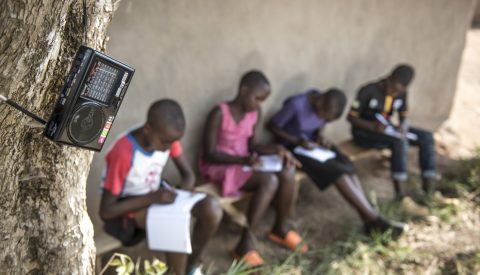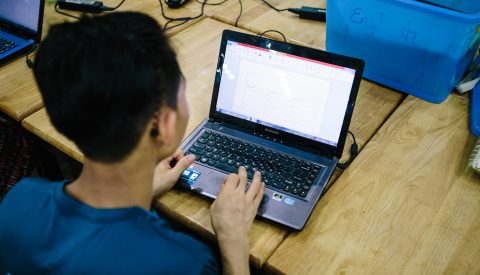Digital solutions can increase access to education in developing countries
The use of technology is an essential part of Finn Church Aid’s (FCA) education work in developing countries. While many challenges remain, the pandemic has pushed digitalisation to great leaps in the past year.
Education has long moved towards a more digital age in most developed countries, and the Covid-19 pandemic has pressured societies to adopt even more remote working and learning tools. Both digital skills and the availability of online services are constantly expanding and improving, but the process is different in poor and fragile environments.
FCA is working towards more digitalised approaches in education projects in Africa and Asia, and the Covid-19 pandemic has increased the demand for new solutions. A year ago, FCA’s Coordinator of Innovations Pasi Aaltonen surveyed the pandemic’s effects on the education sector.
“Education professionals at FCA were already making use of technology in education projects in many ways. The digitalisation of education was developing through platforms such as Zoom and Teams, television and radio,” Aaltonen says.
Projects currently utilise simple technologies. Radios are convenient in countries where the means for telecommunication are either underdeveloped or out of reach for low-income families.
In Kenya, FCA distributed radios with memory card slots that enable learners to record lectures broadcasted on local radio, ultimately supporting pupils with revising the classes. Radio education guidelines were developed in the process and shared with colleagues in other countries.

Children attending a radio lecture in Uganda. Photo: Hugh Rutherford
In Cambodia and Myanmar, computers and smart devices are used in the training of teachers and career counsellors. The career counselling trainers recorded video material that was further distributed in chats and Facebook groups and also shared by Cambodia’s Ministry of Education.
“The videos are paired up with worksheets since the pupils do not have exercise books. Video-based education is a new concept in Cambodia, but during the pandemic and the school closures, it has enabled education to continue without interruptions”, says Sari Turunen, education specialist for FCA in Cambodia.
In Kenya and Uganda, a mobile mentoring project for teachers has garnered good results, even though few own smartphones. FCA has provided smartphones for the teachers, who generally have decent digital skills. The greatest challenge is guaranteeing a sufficient Internet connection for everyone – and that is one of the key issues for the future of digitalisation in developing countries.
Electronic learning materials can endure disasters
Pasi Aaltonen had a realisation in the Philippines in 2014 when he participated in rebuilding schools damaged by the devastating typhoon Haiyan. The disaster had destroyed all the physical education materials, and Aaltonen thought about how much easier it would be to replace them with electronic materials.
Today, FCA’s digital efforts particularly focus on distributing e-learning materials. In many countries, printing and transporting school materials is both expensive and laborious. E-solutions may also be better for environmental reasons, with solar panels as an energy source.
“Digitalisation also brings benefits and new pedagogical approaches. Educational software enables gamification, interaction, and personalisation, among other things”, says Aaltonen.
Many of FCA’s programme countries follow a traditional style of pedagogy in which the teacher stands in front of the classroom. E-devices enable a shift to a more learner-based pedagogy. This provides more opportunities to involve learners and shift more responsibility to the learner to learn, apply information, and make schedules. Digital solutions also give variety to the learning methods.
In the future, digitalisation will hopefully reach groups that otherwise have no access to education, such as young mothers who dropped out of school or people with disabilities. They may find it challenging to leave their home, but remote education could enable them to participate and learn as well. Parts of vocational training could also be carried out online, and the same applies to subjects like career counselling.

Teachers make use of smartphones in mobile mentoring. Photo: Sumy Sadurni
Connectivity the greatest challenge in developing countries
Turning education electronic requires four elements: user skills, a terminal device, software, and an internet connection. In developing countries, connectivity is the biggest challenge, Aaltonen says.
“Many people already have the skills required, and devices and software can be obtained, but we still have a long way to go to secure functioning and reliable connections in our regions of operation.”
In terms of sustainable long-term education work, it is necessary to build development on low-cost equipment that can be maintained and fixed locally when needed. Even though many basic devices are inexpensive in developed countries, this is not the case in low-income, fragile countries.
Local ownership of the solutions and local people taking responsibility for developing tools are also essential to avoid a helper–victim mentality and create opportunities for people to develop technology to fit their own needs.
“The digital skills of local actors should also be enhanced from the viewpoint of creating educational content, in order to enable them to create content of high pedagogical quality to fit the local curriculum,” says Pauliina Kemppainen, education specialist for FCA in East Africa.
Software suitable for FCA’s education projects is available but the challenge is to find partners and funding for a project in which a specific software template is developed together to answer the identified needs of FCA’s operational environment. The traditional model for software acquisition consists of purchasing a finished product. The partner company should have the courage and the financial means to embark on a long development project with FCA. In addition, software development does not end when it is taken into use but requires a commitment to update it throughout its lifespan.

Learning on a computer in Myanmar. Photo: Tatu Blomqvist
Digital solutions are limitless but change takes time
In the global field, the advent of digitalisation is met with great enthusiasm, as electronic devices have been found to bring about change quite efficiently. Digital tools may also facilitate work and result in reduced costs elsewhere. Due to the Covid-19 pandemic, many countries, especially low-income ones, have been forced to cut costs on education, a report by the World Bank and UNESCO reveals. School closures have affected nearly every pupil in the world. It is, therefore, more urgent than ever to utilise new technologies that enhance education and make it more accessible.
Although large international organisations have already been able to try out new technologies, significant change happens slowly. Guided by Pasi Aaltonen, FCA collaborates with other Finnish NGOs on various forums that also welcome businesses and universities. Three FCA education specialists are participating in the qualification programme for product and service development at Omnia vocational college, in which they are collaborating to research digitalised remote education. The fruits of their work and knowledge can be available for implementation in the upcoming years.
“Our aim is that in five years, at least part of the schools in our programme countries has digital equipment, software, and Internet connection at their disposal,” says Aaltonen. “To achieve that already requires a great deal of work, especially in terms of securing funding.”
Digitalisation brings limitless solutions, and some of them, such as the utilisation of drones and robots, sound like fantasy. Currently, plans could include bringing local servers to villages, which would enable the creation of a personal network for the village, with SIM cards that could be distributed to locals for education and work purposes. Even blockchain technology could be utilised in education, as it would enable encryption and verification. This could help create things such as a study credit register, which could have great societal significance in developing countries.
Additional comments for the article were obtained from Ikali Karvinen, country director in Cambodia, and education specialist Carita Cruz.
Text: Nora Luoma
Translation: Leena Vuolteenaho